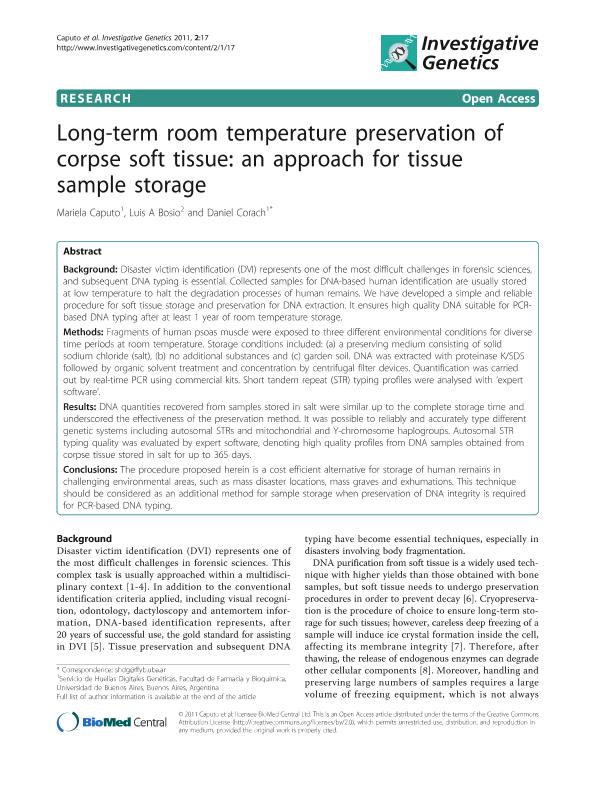Mostrar el registro sencillo del ítem
dc.contributor.author
Caputo, Mariela

dc.contributor.author
Bosio. Luis A.

dc.contributor.author
Corach, Daniel

dc.date.available
2017-05-10T21:37:09Z
dc.date.issued
2011-08
dc.identifier.citation
Caputo, Mariela; Bosio. Luis A.; Corach, Daniel; Long-term room temperature preservation of corpse soft tissue: an approach for tissue sample storage; BioMed Central; Investigative Genetics; 2; 17; 8-2011; 1-6
dc.identifier.issn
2041-2223
dc.identifier.uri
http://hdl.handle.net/11336/16257
dc.description.abstract
Background: Disaster victim identification (DVI) represents one of the most difficult challenges in forensic sciences, and subsequent DNA typing is essential. Collected samples for DNA-based human identification are usually stored at low temperature to halt the degradation processes of human remains. We have developed a simple and reliable procedure for soft tissue storage and preservation for DNA extraction. It ensures high quality DNA suitable for PCR- based DNA typing after at least 1 year of room temperature storage. Methods: Fragments of human psoas muscle were exposed to three different environmental conditions for diverse time periods at room temperature. Storage conditions included: (a) a preserving medium consisting of solid sodium chloride (salt), (b) no additional substances and (c) garden soil. DNA was extracted with proteinase K/SDS followed by organic solvent treatment and concentration by centrifugal filter devices. Quantification was carried out by real-time PCR using commercial kits. Short tandem repeat (STR) typing profiles were analysed with 'expert software'. Results: DNA quantities recovered from samples stored in salt were similar up to the complete storage time and underscored the effectiveness of the preservation method. It was possible to reliably and accurately type different genetic systems including autosomal STRs and mitochondrial and Y-chromosome haplogroups. Autosomal STR typing quality was evaluated by expert software, denoting high quality profiles from DNA samples obtained from corpse tissue stored in salt for up to 365 days. Conclusions: The procedure proposed herein is a cost efficient alternative for storage of human remains in challenging environmental areas, such as mass disaster locations, mass graves and exhumations. This technique should be considered as an additional method for sample storage when preservation of DNA integrity is required for PCR-based DNA typing.
dc.format
application/pdf
dc.language.iso
eng
dc.publisher
BioMed Central

dc.rights
info:eu-repo/semantics/openAccess
dc.rights.uri
https://creativecommons.org/licenses/by/2.5/ar/
dc.subject
Room Temperature
dc.subject
Dna Extraction
dc.subject
Preservation of Corpse Soft Tissue
dc.subject.classification
Genética y Herencia

dc.subject.classification
Ciencias Biológicas

dc.subject.classification
CIENCIAS NATURALES Y EXACTAS

dc.title
Long-term room temperature preservation of corpse soft tissue: an approach for tissue sample storage
dc.type
info:eu-repo/semantics/article
dc.type
info:ar-repo/semantics/artículo
dc.type
info:eu-repo/semantics/publishedVersion
dc.date.updated
2017-05-10T19:58:50Z
dc.journal.volume
2
dc.journal.number
17
dc.journal.pagination
1-6
dc.journal.pais
Reino Unido

dc.journal.ciudad
Londres
dc.description.fil
Fil: Caputo, Mariela. Universidad de Buenos Aires. Facultad de Farmacia y Bioquímica. Servicio de Huellas Digitales Genéticas; Argentina. Consejo Nacional de Investigaciones Científicas y Técnicas; Argentina
dc.description.fil
Fil: Bosio. Luis A.. Universidad de Buenos Aires. Facultad de Medicina. Cátedra de Medicina Legal y Deontología Médica. Servicio de Antropología Forense; Argentina
dc.description.fil
Fil: Corach, Daniel. Universidad de Buenos Aires. Facultad de Farmacia y Bioquímica. Servicio de Huellas Digitales Genéticas; Argentina. Consejo Nacional de Investigaciones Científicas y Técnicas; Argentina
dc.journal.title
Investigative Genetics
dc.relation.alternativeid
info:eu-repo/semantics/altIdentifier/url/https://investigativegenetics.biomedcentral.com/articles/10.1186/2041-2223-2-17
dc.relation.alternativeid
info:eu-repo/semantics/altIdentifier/doi/http://dx.doi.org/10.1186/2041-2223-2-17
Archivos asociados
